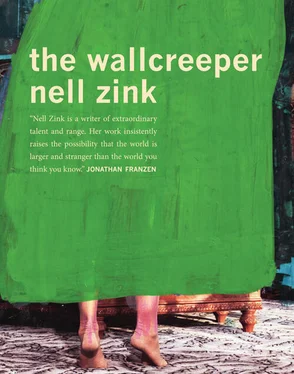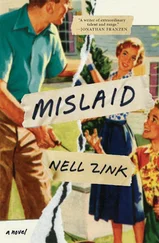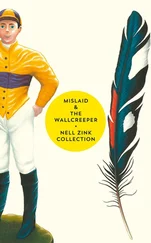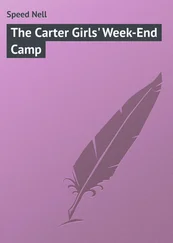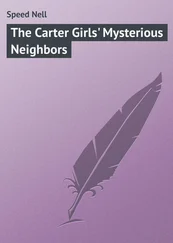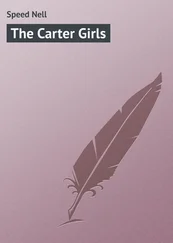“That was your old girlfriend,” I said. “I say forget the Rhine. It’s past saving. It’s a drainage ditch. The Elbe is where it all goes down. I like the Elbe. It has real cable ferryboats, not the tourist kind. It has dioxins and nuclear waste. It makes the other rivers seem so plastic.”
He hung his head. “Why didn’t you tell me? I could have talked some sense into you. The Tree Farm is year-round osprey habitat. Do you know you’re disturbing ospreys?”
“Gernot told me to keep quiet.”
“The Elbe is Germany’s last free-flowing river. Nine hundred cubic meters a second. It’s way out of your league.”
I frowned.
He was silent, briefly. Then he piped up, “You do know Gernot was an IM, right?”
An ee-em, short for inoffizieller Mitarbeiter , meaning unofficial employee: an East German Stasi informant who entrapped friends and neighbors for the sake of professional advancement.
“That’s impossible,” I countered. “The guy never worked a day in his life.”
But it seemed plausible enough. If a guy has a fancy job in the public eye (German preachers are civil servants and Wittenberg is not the most obscure venue), and all he ever talks to you about is the oft-overlooked beauty of voles, etc., you could get suspicious. You could start wondering whether you’re apprenticing with an anarcho-sensualist renegade or just easily led.
In Olaf’s view, Gernot must be doing something to get off, and it was more likely to involve my ass than voles, while his media-shyness suggested one thing only: guilt. Olaf didn’t believe in the innocence of people with critical faculties. The injustice of mortal existence cried out with greed for euphoria. Delicacy had no place in Olaf’s world.
It was a difficult discussion. But eventually Olaf weighed his life’s work against the value of keeping me off the streets of Berlin, and my lax morals won. The ospreys would have to take a back seat, because he and I were that most common of endangered species: adulterers. The love that dare not speak its name. Not so long ago, it would have been legal for Stephen to shoot us on sight. We had to stick together. As for Gernot’s being a Stasi fink, when I brought it up, Gernot got mad. As in really angry. He demanded to know what person of despicable character, compared to whom pig-dogs are models of rectitude, would stoop so low as to retail an accusation that had made the rounds in 1990 but was disproven more conclusively with each passing year, since by this time everybody and his brother had pored over Stasi files looking for evidence of persecution (if it turned out they had targeted you, you had joined the democratic resistance retroactively, which is definitely the easiest way), but none had yet unmasked him.
“Olaf?” I said tentatively.
Gernot looked grim.
“Olaf!” I added, realizing that Olaf could have lied.
On Christmas I talked with Stephen on the phone. He said Macedonia was cold, but not as bad as Kamchatka (meaning Breitenhagen).
On New Year’s I went up to Berlin to check up on our apartment. It was fine. Stephen’s scholarship kept paying out, and we had set up our bank account to pay the rent and utilities automatically, so it was actually turning a small profit.
I only spent two nights. It was dark and freezing. Neighbors I’d never seen before were setting off bottle rockets in the courtyard.
And thus it was that I acquired red cheeks and pit-pony-like endurance and became inured to physical pain. I spent every thaw heaving rocks into the river from its steep banks, trying not to be dragged in myself by their weight. I hammered on stubborn seams with tears of frustration in my eyes, slowly coming to understand The Gulag Archipelago and The House of the Dead. I spent entire days commuting between the bed and the bathtub, convalescing.
By mid-February, the gap in the cladding of the banks really was fair size. Most of the rocks were at the bottom of the river, having who knows what effect on it — speeding its flow (bad), slowing its erosion (good), one or the other, depending on whether you listened to Olaf or Gernot.
I experienced the transition from winter to early spring. I saw the moss turn green. Really green, from bottle green to kelly green, with long silky feelers and fur. I heard birds throw themselves into relentless singing the moment they felt the approach of dawn. I saw robins kick rival robins when they were down. Life surged into the trees from below, reddening their twigs. I saw the first bugs on their first forays. All around me, frost was turning to slime. I was looking muscular and outdoorsy and more like a birdwatcher’s dream date (the sort of biologist who spends months alone in tern colonies) than ever before. Except for occasional phone calls from Stephen, I hadn’t spoken to anyone but Gernot for months, and my German was getting good.
In late March the snow melted in the Czech Republic, and the river rose. Shipping started up again. The bank from which I had removed the granite facing slumped a bit, but no water entered the forest.
I started working on gap number two, though the plan seemed more trivial than ever. The enduring influence of Olaf. He had worked on the dike relocation at The Evil Place, which took years and cost millions, and was an adviser to the Federal Foundation for the Environment, which made NABU and the BUND look like Global Rivers Alliance. And he had parted from me seething, as if I had committed some idiotic stunt like dropping car keys off a boat and would never be a whole person in his eyes again.
Gernot, his hands folded on the table, explained to me that freelance environmentalists had been gravitating toward Germany’s northeast corner for twenty years. In the four months between the first free elections and the hostile takeover by the forces of capitalism, East German activists, working feverishly, had established wildlife sanctuaries that were exceptionally large by German standards. But their trusting ways, inexperience with money, confidence that the meek would inherit the earth, etc. left them disqualified to manage their own conquests, rolling out the mat for carpetbaggers like Olaf.
I decided the two men weren’t very fond of each other.
I stopped working in mid-April and took up the sweet life. I rode Gernot’s bike to all the lakes and checked out every bar in every village.
I missed Berne, but I was not one to hang my harp on the willows and weep. I could easily imagine living in Breitenhagen forever, as long as no one expected me to earn a living. The tap water was delicious, and Gernot kept me in rabbit lettuce, rolled oats, and assorted tubers.
One highlight of the springtime was the annual Elbe Conference in Magdeburg. I got to see Gernot in full effect as a clergyman, which involved eyebrows drawn into a high inverted V. It was a look of deep concern for all mankind, or in this particular case for taxpayers naïve enough to be suckered into shoring up the sagging banks of the forever wild Elbe. The presenters were a mixed bag, from lobbyists and businessmen to a Czech diplomat and the head of the WSA. The Czech attaché cited the Congress of Vienna. The civil engineer said he was just following orders. A BUND activist argued that the Elbe corridor already had perfectly serviceable rail lines, and a soda ash magnate countered that his transportation costs might be marginally lower if the railroad had competition from a canal that would require an initial public investment of only a hundred and fifty million euros. A guy from the railroad wondered aloud what they thought they were talking about, since the soda ash magnate had his own fleet of trucks and the existing rail line was slated to be scrapped. And so it went on, everyone contradicting everyone else with conflicting incontrovertible facts.
Читать дальше
Конец ознакомительного отрывка
Купить книгу
